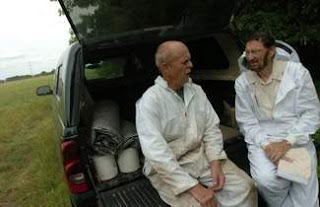Originally published Sunday, Aug. 9, 2009
By Nadia Malik
Daily Herald Staff Writer
It's not just about Curtis Rolfe and the bees he wasn't allowed to keep.
Rolfe wanted to tend a beehive on his property in Milton Township, but that's not allowed by law. He got the Lombard Park District's permission to keep the hive on nearby park property, but that arrangement fell through after neighbors complained.
That forced Rolfe to move the hive to his son's home in Ottawa, where he's not sure he'll be able to visit enough to care adequately for the bees.
And that's a shame, say experts on bees. Hobbyists such as Rolfe help maintain the dwindling bee population. And because bees pollinate our flowers, fruits and vegetables, their work is critical.
Rolfe and his wife Leanne were disappointed when the hive got the boot from park district property.
"They didn't say why or what the complaint was," Leanne said. "The bottom line is that they're not an aggressive bee. They won't hurt anybody."
The insects that actually sting most often, experts say, are yellowjackets, not honeybees, which attack only when harassed.
However, park board President Keith Giagnorio said the hive would be a liability to the district if someone did provoke the bees.
The Rolfes had to move the bees off their property because Milton Township allows hives only on properties of at least five acres, because honeybees are classified as "livestock."
The bees thrived on the Rolfes property for about three months. Curtis Rolfe said they had multiplied a few times and had started producing a good amount of honey before they were moved. He had hoped to use his hive as an educational tool for children in the neighborhood.
"I am very aware of how the bees are losing out in this world," he said.
Honeybees have been mysteriously disappearing, suspected to be the result of a virus that is causing colony collapse disorder.
Charles Lorence, co-president of the Cook-DuPage Beekeepers Association, which meets in Oak Brook, said some towns are becoming more relaxed about their bee laws because they see the threat of waning bee populations.
In fact, the city of Chicago has beehives on the roof of city hall and the Chicago Cultural Center.
However, Lorence wants to push for more villages to allow at least one hive on properties.
Lorence, who has apiaries - multiple beehives - in a forest preserve in Aurora and in the Morton Arboretum in Lisle, said a third of the food supply in America is pollinated by bees.
"They have an almost intrinsic value to humans," he said.
He said if the population keeps falling, the prices for fruits and vegetables could skyrocket, creating the possibility of $5 apples.
"The hobbyists are really doing everybody a favor," Leanne Rolfe said.
Although Rolfe's hive is now with his son, Curtis hopes he can move it back closer to his own home near Glen Ellyn soon.
He said he's going to approach churches or any buildings that are on more than 5 acres to see if they'd be willing to house his hobby.
Otherwise, he won't be able to drive out to Ottawa on a regular basis to tend to his hive, which requires some care in the colder months, when bees aren't able to feed as much on their own.


Beekeeper advocate Charles Lorence, left, and Curtis Rolfe say caring for beehives helps stave off the dwindling population of honeybees.
Photo by Paul Michna/Daily Herald
Curtis Rolfe tends to a hive
in Aurora. He was asked to move
his own hive off Lombard Park
District property after
neighbors complained.
Photo by Paul Michna/Daily Herald
No comments:
Post a Comment